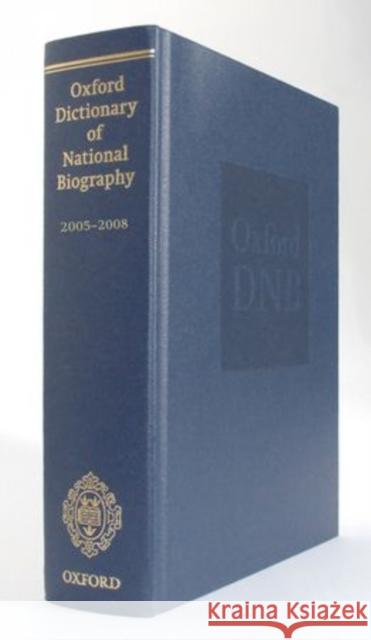Oxford Dictionary of National Biography Supplement: 2005-2008 » książka
Oxford Dictionary of National Biography Supplement: 2005-2008
ISBN-13: 9780199671540 / Angielski / Twarda / 2013 / 1264 str.
Who made modern Britain? This book, drawn from the award-winning Oxford Dictionary of National Biography, tells the story of our recent past through the lives of those who shaped national life. Following on from the Oxford DNB's first supplement volume-noteworthy people who died between 2001 and 2004-this new volume offers biographies of more than 850 men and women who left their mark on twentieth and twenty-first century Britain, and who died in the years 2005 to 2008.
Here are the people responsible for major developments in national life: from politics, the arts, business, technology, and law to military service, sport, education, science, and medicine. Many are closely connected to specific periods in Britain's recent history. From the 1950s, the young Harold Pinter or the Yorkshire cricketer, Fred Trueman, for example. From the Sixties, the footballer George Best, photographer Patrick Lichfield, and the Pink Floyd musician, Syd Barrett. It's hard to look back to the 1970s without thinking of Edward Heath and James Callaghan, who led the country for seven years in that turbulent decade; or similarly Freddie Laker, pioneer of budget air travel, and the comedians Ronnie Barker and Dave Allen who entertained with their sketch shows and sit coms. A decade later you probably browsed in Anita Roddick's Body Shop, or danced to the music of Factory Records, established by the Manchester entrepreneur, Tony Wilson. In the 1990s you may have hoped that 'Things can only get better' with a New Labour government which included Robin Cook and Mo Mowlam.
Many in this volume are remembered for lives dedicated to a profession or cause: Bill Deedes or Conor Cruise O'Brien in journalism; Ned Sherrin in broadcasting or, indeed, Ted Heath whose political career spanned more than 50 years. Others were responsible for discoveries or innovations of lasting legacy and benefit-among them the epidemiologist Richard Doll, who made the link between smoking and lung cancer, Cicely Saunders, creator of the hospice movement, and Chad Varah, founder of the Samaritans.
With John Profumo-who gave his name to a scandal-policeman Malcolm Fewtrell-who investigated the Great Train Robbery-or the Russian dissident Aleksandr Litvinenko-who was killed in London in 2006-we have individuals best known for specific moments in our recent past. Others are synonymous with popular objects and experiences evocative of recent decades: Mastermind with Magnus Magnusson, the PG-Tips chimpanzees trained by Molly Badham, John DeLorean's 'gull-wing' car, or the new British Library designed by Colin St John Wilson-though, as rounded and balanced accounts, Oxford DNB biographies also set these events in the wider context of a person's life story.
Authoritative and accessible, the biographies in this volume are written by specialist authors, many of them leading figures in their field. Here you will find Michael Billington on Harold Pinter, Michael Crick on George Best, Richard Davenport-Hines on Anita Roddick, Brenda Hale on Rose Heilbron, Roy Hattersley on James Callaghan, Simon Heffer on John Profumo, Douglas Hurd on Edward Heath, Alex Jennings on Paul Scofield, Hermione Lee on Pat Kavanagh, Geoffrey Wheatcroft on Conor Cruise O'Brien, and Peregrine Worsthorne on Bill Deedes.
Many in this volume are, naturally, household names. But a good number are also remembered for lives away from the headlines. What in the 1980s became 'Thatcherism' owed much to behind the scenes advice from Ralph Harris and Alfred Sherman; children who learned to read with Ladybird Books must thank their creator, Douglas Keen; while, without its first producer, Verity Lambert, there would have been no Doctor Who. Others are 'ordinary' people capable of remarkable acts. Take, for instance, Arthur Bywater who over two days in 1944 cleared thousands of bombs from a Liverpool munitions factory following an explosion-only to do the same, months later, in an another factory. Awarded the George Cross and the George Medal, Bywater remains the only non-combatant to have received Britain's two highest awards for civilian bravery.











